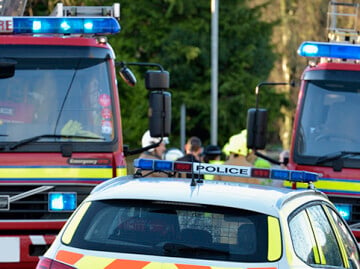Working in partnership
Partnership working is key for the Police and Crime Commissioner (PCC) and the Office of the Police and Crime Commissioner for Norfolk (OPCCN). Different agencies and organisations have to work together to safeguard the vulnerable, prevent crime, support victims and improve the effectiveness of the criminal justice system. Many areas of policing and crime cannot be tackled by a single person or organisation, for example hate crime, domestic abuse and scams, as they need a coordinated approach from a variety of partners to ensure that effective and efficient local solutions are put in place.
The PCC and OPCCN are engaged in, and in some cases lead, a range of partnerships nationally, regionally and locally which are successfully reducing crime, keeping people safe and building resilience in communities across Norfolk.
Norfolk Community Safety Partnership
The Community Safety Partnership brings together organisations from across Norfolk to tackle crime and disorder, and ensure the county remains a safe place for people to live, work and visit. The members of the Community Safety Partnership represent local councils, policing and fire services, youth offending, health and housing. The three key priorities for the Community Safety Partnership are extremism and radicalisation, domestic abuse and sexual violence, and county lines. Sub-groups sit beneath the Community Safety Partnership to drive activity in these priority areas.
More information about the Norfolk Community Safety Partnership
Norfolk Anti-Slavery Network
The Norfolk Anti-Slavery Network (NASN) is a multi-agency partnership that brings together statutory and non-statutory partners from across the county to tackle modern slavery and human trafficking (MSHT).
Norfolk Drug and Alcohol Partnership
As part of the Government drug strategy From Harm to Hope: a 10-year Drugs Plan to Cut Crime and Save Lives, every area in England has been tasked with setting up a partnership that will be responsible for delivering the outcomes of the strategy in a way that is best suited to its population. In Norfolk this is called NDAP, the Norfolk Drug and Alcohol Partnership.
Norfolk Health and Wellbeing Board
The Health and Wellbeing Board works to improve the health and wellbeing of people in Norfolk. It brings together partners from health, local authorities and policing to identify and deliver against shared health, wellbeing and inequality priorities, many of which have links with crime, victimisation and vulnerability.
More information about the Norfolk Health and Wellbeing Board
Road Casualty Reduction Partnership
This partnership of organisations, including those involved in policing and fire services, uses education, training, engineering and publicity with the aim of reducing the number of people killed or injured on Norfolk’s roads – a priority in the Police and Crime Plan.
More information about the Road Casualty Reduction Partnership
Norfolk Reducing Offending Board and Youth Offending Board
Early intervention and tackling the root causes of crime are key to the work of both of these partnerships. Together, criminal justice, community safety and youth service experts are working to prevent individuals, including children and young people, from becoming involved in offending in the first place, and reducing reoffending amongst those who do offend.
More information about the Norfolk Reducing Offending Board and Youth Offending Board
Norfolk and Suffolk Criminal Justice Board
Local Criminal Justice Boards aim to reduce crime, harm and risk by increasing the efficiency and credibility of the criminal justice system. The joint Norfolk and Suffolk Criminal Justice Board is made up of partners from policing, the Crown Prosecution Service, prison and probation services, youth offending, and victim support.
More information about the Norfolk and Suffolk Criminal Justice Board
Norfolk Safeguarding Adults Board
Protecting the vulnerable is a key priority for your PCC. Safeguarding is preventing the physical, emotional, sexual, psychological and financial abuse of adults who have care and support needs, and acting quickly when abuse is suspected. Adult Social Services is the lead organisation in preventing and identifying possible abuse, and as part of this work it hosts Norfolk’s Safeguarding Adults Board made up of partner agencies including the OPCCN.
More information about the Norfolk Safeguarding Adults Board
Norfolk Children’s Safeguarding Board
The primary focus of the Children’s Safeguarding Board is to keep children safe. Every Local Authority in the country has to have a Multi-Agency Safeguarding Agreement which brings together policing, health service and other partners to make sure that children are protected from harm, that their welfare is promoted and those working with children carry out their safeguarding responsibilities as required by the law.
More information about the Norfolk Children's Safeguarding Board
Norfolk Against Scams Partnership
The Norfolk Against Scams Partnership aims to make Norfolk a scam-free county by taking a stand against scams. Being scammed or targeted by fraud can have a devastating impact on vulnerable people in Norfolk. It can also destroy small businesses. This partnership sees statutory organisations, local businesses, charities and community groups working together to support residents and businesses in Norfolk to help protect them from scams, doorstep crime and fraud.
More information about the Norfolk Against Scams Partnership
Flourish
Flourish is the shared ambition of everyone working to improve the lives of children and young people in Norfolk. Members of the Children’s Strategic Partnership are supporters of the Flourish Strategy. As a member, the PCC's office has made a number of pledges, including the development and enhancement of services for children that have been affected by domestic abuse.
Norfolk Water Safety Forum
The Norfolk Water Safety Forum brings together partners from Norfolk and national agencies with the primary aim of increasing safety on Norfolk’s extensive waterways and coastal areas. The Forum’s aims are to prevent incidents, reduce risk and educate the public. With 91 miles of coastline and more than 200 miles of inland waterways, there are plenty of spaces open to the public to enjoy the water safely.
Networks and professional bodies
The PCC and OPCCN are also involved in a wider range of networks and professional bodies, engaging with government and government departments including the Home Office and Ministry of Justice, other PCCs and OPCCs through the Association of Police and Crime Commissioners, and organisations from the public, private, voluntary and faith sectors.


